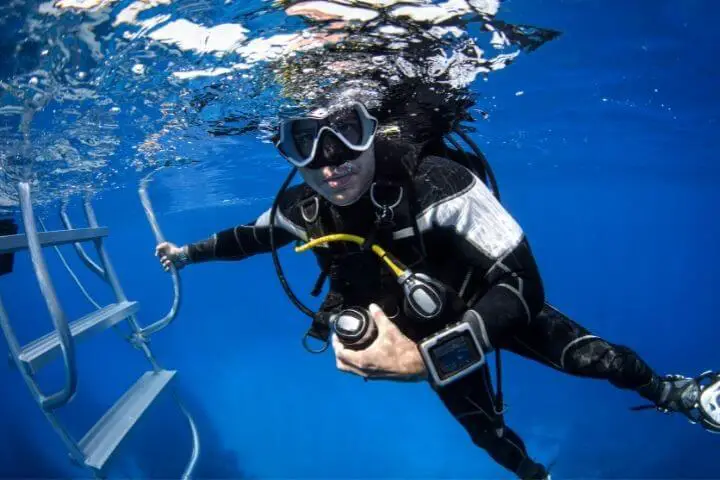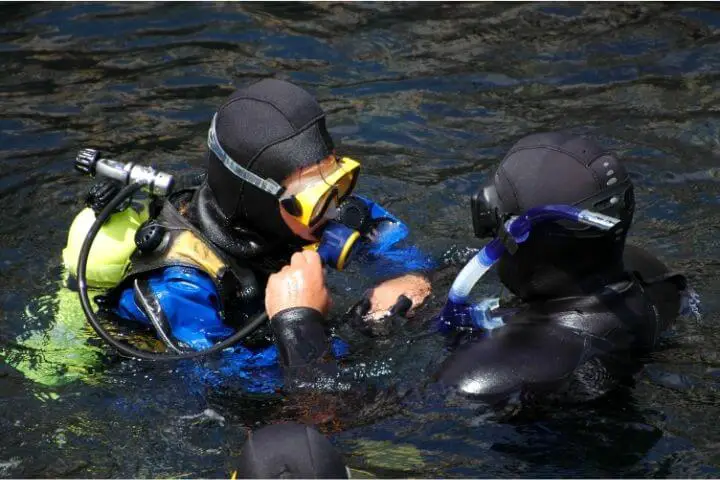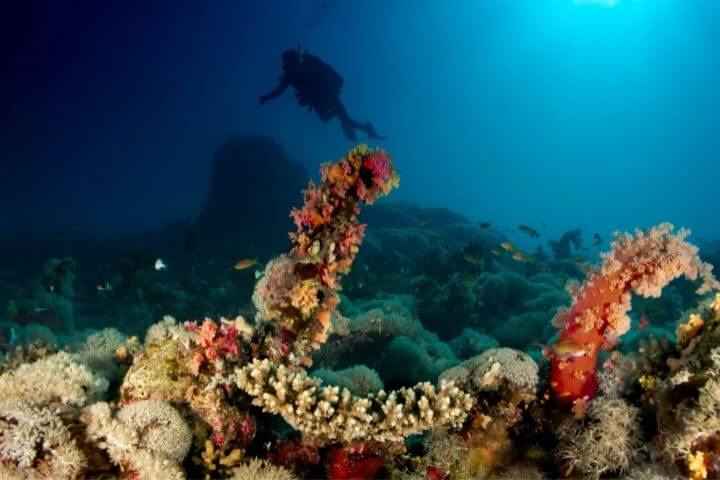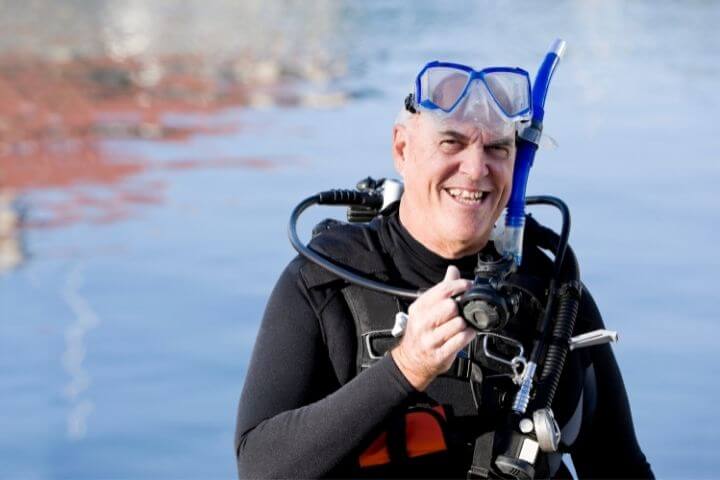Scuba diving is one of those activities that is on almost everyone’s bucket list, even for those people who may be in a wheelchair.

Just being in a wheelchair doesn’t mean you don’t want to participate in the activities that other people can. So, can people who are in a wheelchair (either due to age or disability) scuba dive? In short – yes. And here’s what you need to know.
When you go scuba diving, it offers this kind of weightless environment that can be very liberating – especially for those in a wheelchair. Experiencing this weightlessness allows those who are in a wheelchair some liberation from whatever restraints they may face on land.
Another really cool thing about going scuba diving is that it is almost the ultimate equalizer: everyone is the same underwater and some of the disabilities those who are in a wheelchair face will disappear.
Contents
Are There Special Skills Needed for Scuba Diving in a Wheelchair?
When people learn to scuba dive, even the athletes in the best shape of their lives can struggle with the skills needed to be a successful scuba diver. This is why scuba diving is called the ultimate equalizer because everyone needs to learn the right skills to do it.
One of the biggest skills needed to be a successful scuba diver is buoyancy. This skill can be learned even for those who are in a wheelchair, so this sport is definitely something that can be done by almost everyone.
Scuba Diving as Therapy
Water has long been used as a therapy tool for physical recovery and rehabilitation. So it makes sense that scuba diving can also be used as a kind of therapy for those who are in a wheelchair.
Scuba diving has even been taught to wounded war veterans with well-documented results for those who are living with PTSD as well as physical rehabilitation as needed.
Are there restrictions on the kind of disability that you can scuba dive with?
No two disabilities will be the same, and therefore everyone’s abilities will be varied – even being in a wheelchair. This means there will be various options for students as to how they’re going to learn to scuba dive.
Some people will be able to take their full scuba diving certifications so they can dive on their own, without anyone else to supervise.
Other people, depending on their disability, will need to do dives with certified scuba instructors all the time. There are many dive operators that offer this assistance to those who need supervised dives to scuba dive safely.
There are currently three different levels of diver certifications
- Level A: this means that the diver has to dive with just one buddy at all times
- Level B: this level means divers must dive with at least two buddies for each dive
- Level C: divers on this level must also dive with two buddies, but one must be a certified and trained CPR provider
The level of diver you will be able to achieve will depend on your abilities and any limitations you have that would impact your ability to scuba dive safely.

Health Benefits of Scuba Diving
Regardless of whether you’re in a wheelchair, the health benefits experienced by those who go scuba diving are amazing. It can greatly improve your overall health and fitness levels in just a short time.
First, the feeling of being able to glide through the water – almost completely weightless – has been shown to have an overall calming effect on people who experience it.
On top of that, diving will challenge your overall cardiovascular strength and help you build up your endurance levels.
Many people who are living with PTSD, stress or anxiety have found that diving relieves the symptoms they experience in living with these conditions.
As divers really need to focus on the aspects of diving, and making sure they stay safe underwater, can offer an escape for divers from whatever it may be that they need to deal with once they resurface.
Further, since diving offers everyone a really wide range of mobility, those who have limited mobility feel very free while under the water. Those who need assistance moving above the surface can often glide through the water with ease and without the assistance of others.
In fact, some divers who are paralyzed have reported feeling more sensations in areas that they are paralyzed in after they started diving.
For those who experience chronic pain with their condition, they often say that their pain symptoms are alleviated under water.
Regardless of a disability, scuba diving is also a very social sport. It allows people who share a common passion to interact with each other and spend time doing the thing they really enjoy.
Diving with others encourages participation with others, and also forces people to work on their communication as it’s critical to be able to effectively communicate with others while under water.
Sharing in experiences with others can create long last friendships and bonds that help feed our need for socialization as humans. Sometimes the best thing we can do for ourselves is to create and share in experiences with others.
Many times, being in a wheelchair, creates feelings of isolation and loneliness. Finding something you can share with others, where you may feel like you aren’t disabled or disadvantaged, can really help.
What You Need to Know Before You Go Scuba Diving
Almost all the equipment and courses needed for scuba diving have been adopted by companies and instructors so that they fit the needs and abilities of various people.
Everyone will need to complete some key performance requirements, though, if they are going to get their certifications. And those requirements will vary depending on the type of certification the person is trying to achieve.
Student divers will work with the instructors to figure out the best way to complete all the necessary requirements within the abilities they do have.

There are some basic health requirements students must have before diving, though. There are safety procedures that each diver must be able to understand and complete.
In addition to understanding the safety procedures, divers will need to pass certain health requirements. Those students who have circulatory, respiratory illnesses, heart diseases, ear conditions or severe mental health issues may not be allowed to scuba dive.
Once a student has been cleared to dive, based on the health requirements, there are no differences between those who are disabled and able-bodied.
Many instructors love teaching scuba diving, and love getting everyone involved in the sport – regardless of being in a wheelchair or not.
For instructors, working with students and seeing them become successful in this sport that they love is the best part about teaching.
Seniors and Scuba Diving
If scuba diving has been on your bucket list for a while, but you’re worried that you’re too old to do it – don’t!
There are some additional risks for those who are elderly that want to go scuba diving, but that doesn’t mean you can’t try it (or maybe even make it a new hobby).
Risks of Old Age and Scuba Diving
While age doesn’t necessarily mean your risks while scuba diving are increased, there are some illnesses and conditions that can put elderly divers at a higher risk than younger ones.
For example, a minor cardiovascular episode on land can make you feel a little lightheaded or dizzy. However, this same thing – if it happened underwater – could cause you to drown. Additionally, getting the right help while underwater can be almost impossible sometimes.
Additionally, decreased bone mass and less muscle strength can be an issue when going scuba diving. The sport does involve carrying a lot of heavy gear on land – where you aren’t weightless – so if you don’t have the muscle strength to carry the gear it could be an issue.

Other Health Considerations
While you do need to have generally good health, specifical with regard to pulmonary and cardiovascular health, you should still continue to monitor your health with your doctor.
Try your best to follow a heart-healthy diet and try not smoke (at any age, but especially as you enter your senior years).
On top of this, you should also get your eyesight checked out regularly as this is part of our body that can rapidly deteriorate as we age.
So Is Diving Safe for Seniors, Then?
In general, the answer is yes, there is nothing to support the fact that there are more accidents in scuba dating related to the age of the diver than anything else.
There are some health conditions that may prevent seniors from being able to dive, however, these conditions are for everyone and are not unique to seniors.
By following the guidelines of our doctors, and trying to follow a fit and active lifestyle there’s no reason that seniors and those in a wheelchair can’t enjoy the benefits and beauty of scuba diving.
If you have questions about how to start scuba diving or what would be needed to make sure you pass the requirements, you can reach out to your local scuba shop as they will be able to help!
